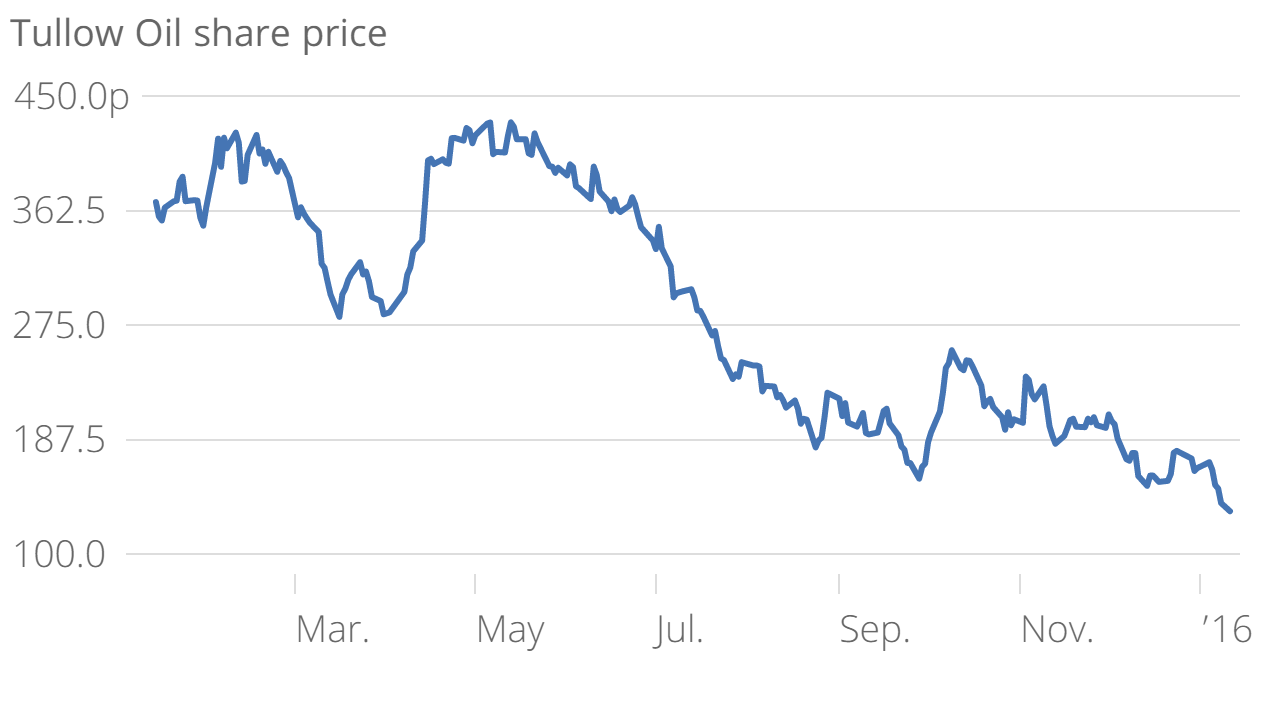Tullow Oil share prices rises as it cuts expenditure

Against a backdrop of falling oil prices, Tullow Oil has posted results in line with market expectations – which caused the company's share price to rise over seven per cent as markets opened.
The figures
Tullow Oil reported that, for the full year 2015, it expects to deliver revenue of $1.6bn (£1.11bn), in line with market expectations.
Pre-tax operating cash flow is expected to hit $1bn, while gross profit is expected to come in at $600m, also in line with forecasts.
But the company said that because of low oil prices – global benchmark Brent crude is edging ever-closer to $30 per barrel – a number of accounting charges will be factored into the group's full-year results for 2015.
Also as a consequence of low oil prices, capital expenditure associated with operating activities will be cut from $1.7bn in 2015 to $1.1bn in 2016, the company said.

Why it's interesting
Tullow Oil, like others, has been hit by the plummeting price of oil. The fall in oil prices caused a post-tax exploration write-off of $400m, a post-tax impairment charge of $300m and an onerous rig contract charge of $200m as a result of much lower levels of exploration and appraisal drilling activity planned for 2016.
And in response to the lower price of oil, the company has cut its capital expenditure, and said it will continue to cut this along with costs. Capital expenditure was $200m less than expected in 2015.
Read more: Tullow shares jump on oil find in Kenya
Still, in the context of falling oil prices the primary focus of the group in 2016 remains to deleverage the balance sheet, the company said.
This is important because “stocks with net debt are in survival mode until we truly know how the oil price will pan out, that is, until we know if prices will ever go higher”, said Mark Wilson, equity analyst at Jeffries International Limited.
Read more: Tullow Oil's share price is surging
“So, the statement that "the primary focus of the group in 2016 remains to deleverage the balance sheet" is a simple message of reality in the current environment. We feel this deleverage has to come from selling a portion of Tullow's working interest in projects in East Africa,” he added.
The progress made at the Ten project off the coast of Ghana provided some better news. Tullow is expecting to begin production there in the middle of 2016. And the company also said it began 2016 with $1.9bn in undrawn bank facilities, allowing it to draw on cash if it needs to.
"As we look ahead to 2016, Tullow's hedging position provides significant protection of future revenues and cashflows," the company added. Indeed, it was strong West African oil production supported by a significant hedge programme that allowed the company to hit a pre-tax operating cash flow of $1bn.
What Tullow Oil said
Aidan Heavey, chief executive, said:
In 2015, Tullow not only reset its business to deal with very difficult market conditions but also delivered on its key operational goals.
We continue to focus on driving down our costs and capital expenditure and, at the beginning of 2016, Tullow has a mark-to-market hedge value of over $600m and financial headroom of $1.9bn.
Accordingly, we have a diversified balance sheet which supports our planned activities for the year ahead.
In short
Tullow Oil reset its business in 2015 to deal with falling oil prices, and with $1.9bn in cashflow and loans from banks, the company said it has enough cash to overcome low oil prices.